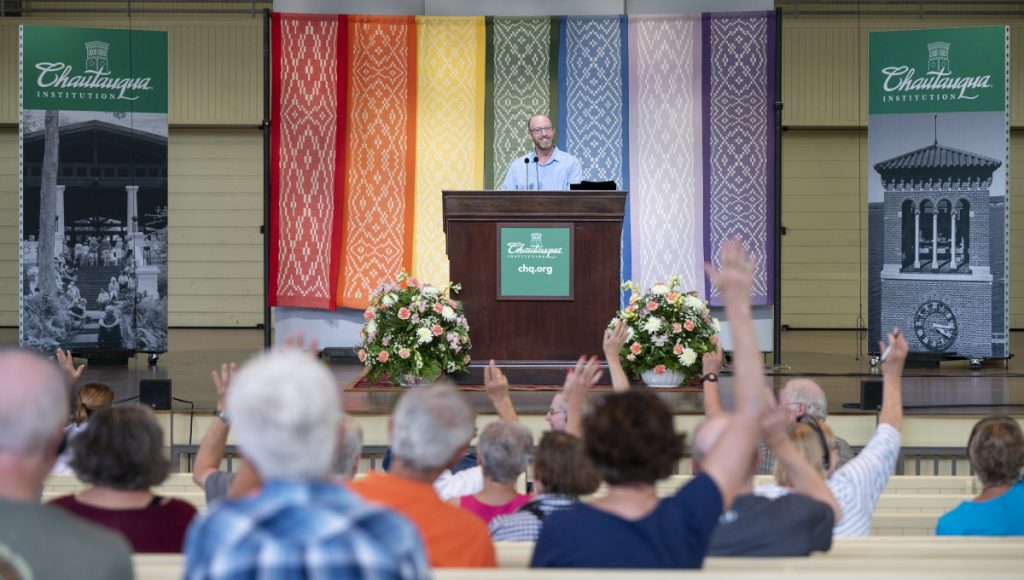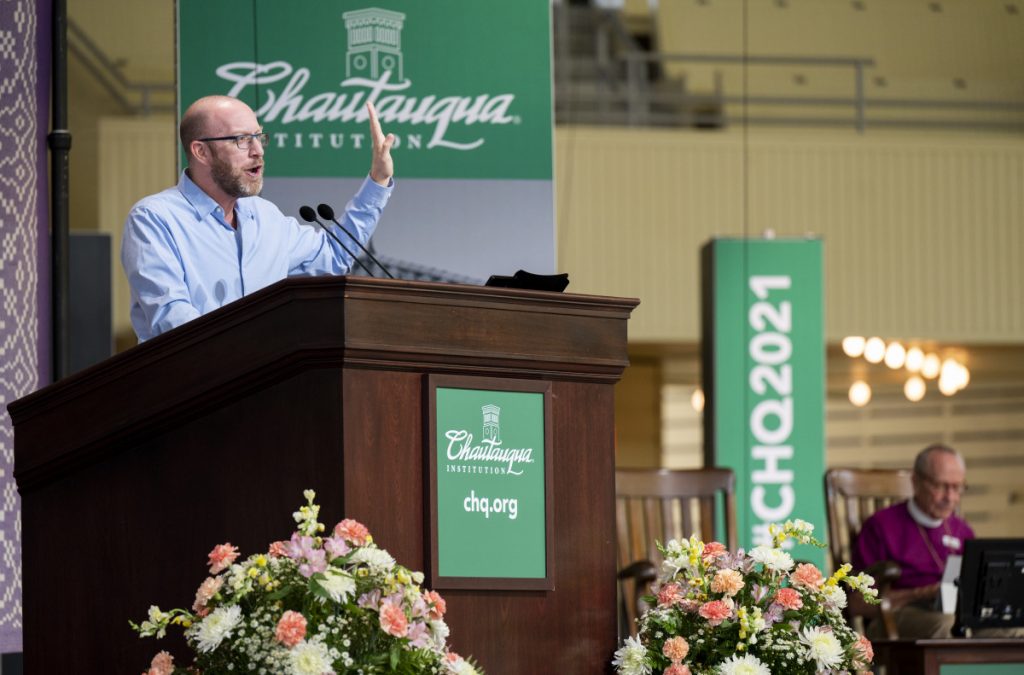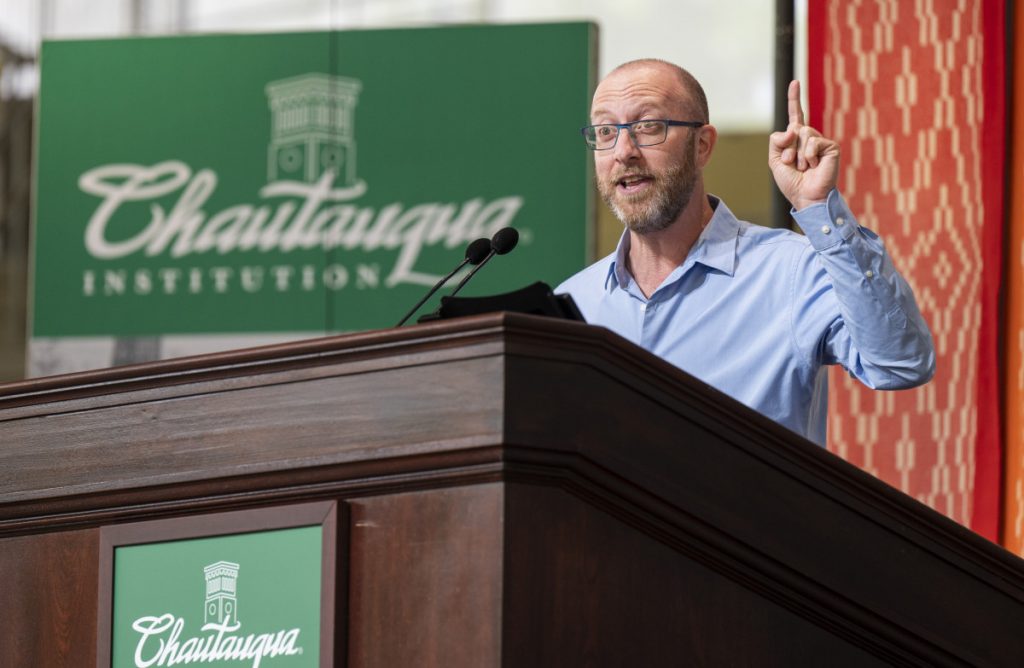
MAX ZAMBRANO – STAFF WRITER
As he walked onto the Amphitheater stage Wednesday afternoon, comedian Benji Lovitt thanked everyone for coming to his first annual lecture at Chautauqua. He said the organizers didn’t know this would be an annual event, but he’s working it out.
Lovitt wanted to get to know his audience more, so he asked them to raise their hands to a series of questions, such as if this was also their first visit, or if they’re watching the Olympics.
“Finally, raise your hand if you’re carrying a large amount of cash as we speak. Keep those hands up, let me look,” he said.
Lovitt flew from Tel Aviv, Israel, to Chautauqua for his lecture “The Power of Humor: Laughing to Keep from Crying,” the final Interfaith Lecture Series of Week Five, themed “The Authentic Comedic Voice: Truth Born of Struggle,” a week in partnership with the National Comedy Center.
When he told people he was coming to New York State, he realized how annoying it was for people to ignore every word after “York.” People asked him if he was going to Broadway.
“Not unless they moved it,” he said. “It’s off-off-off-Broadway. It’s so off, it’s back on.”
He noted a stark difference in the weather here compared to Israel, particularly when walking through Palestine Park.
“I gotta say, I think I like it more than the real one,” she said. “No humidity, no fighting; I might stick around.”
Lovitt also pointed out a ceramics class on the grounds costing $150. His lecture cost $15.
“What are they sculpting? Pyramids? That means you need 10 of me to get an equal value.”
But, he was happy to be in person after a year and half of Zoom events.
“Stand-up by Zoom is awful. Communication is one way. I get no positive feedback. I’m lucky to see anyone smiling. Reminds me of my childhood,” he said. “My mom hates that joke.”
Complaining is a part of Jewish humor, he said. He told a joke of a Jewish woman in the hospital who told her doctor she wanted to be transferred. He asked if it was the food, she said it was delicious and that she couldn’t kvetch, the Yiddish word for complain. It wasn’t the room, nor the staff — she said both were great. The doctor asked her why she wanted to be transferred then.
“I can’t kvetch,” she said.
Lovitt said complaints, though, should never be about important things, just if it’s hot out or the line is long. It’s a way of coping and existing, he said.
Comedy is a silly, foolish or witty way to deviate from the expected reality, and it can be insightful and enlightening, Lovitt said.
“Most of all, comedy can be cathartic and therapeutic, releasing tension in a way that allows the joke teller and the audience to heal and draw power,” he said.
Lovitt said people often ask him where he comes up with his material.
“I’ll tell you where I don’t get it from: happiness and success,” he said. “There’s nothing funny about that. Plus, I have neither.”
If everything has gone well for someone, then there can’t be anything to complain about, he said. Comedians talk about their partners’ nagging, bad cooking or pet peeves, not their perfect eggplant parmesan, he said.
Lovitt referenced a “Saturday Night Live” sketch, “Word Association,” starring Richard Pryor and Chevy Chase. In it, the interviewer, Chase, is asking Pryor’s character for word associations, which turns into Black and white racial slurs coming from both men. The idea came from Paul Mooney, who had a poor relationship with Lorne Michaels and NBC executives.
“After all the BS I’ve been put through to get here, and the bleeping cross-examination Lorne subjects me to, I decided to do a job interview of my own,” Lovitt said, reading from a letter written by Mooney. The censorings were Lovitt’s edits.
This humor demonstrates the ability to speak the truth in comedy and send a message, Lovitt said.
Lovitt’s outsider perspective comes from living in Israel. He was born in Dallas, and had lived in other cities like Atlanta and New York City before deciding to make his international move. He’s been living there for the last 15 years.

His stand-up career became much more serious in Israel, he said.
“First of all, performing in English as an expat makes you a big fish in a small pond, which is far less intimidating and dog-eat-dog than the clubs in New York City,” he said. “But, more than that, if a good comedian needs diversity and a little bit of suffering for comedic inspiration, I found myself sitting on a gold mine.”
Immigrating was the hardest thing Lovitt ever did, he said, because of the different language, cultural norms and social practices. However, it’s provided him with material for a lifetime, he said.
“Only in Israel does a business that’s closed on the Sabbath advertise being open 24/6,” he said.
Israel as a country is 73 years old, he said, so there are plenty of issues with government, infrastructure and the economy, but if a comic could go back to 1849 and see the United States at the same age, he said there would be plenty to make fun of there.
When comedians start their careers, they will make material out of anything, Lovitt said. He used to discuss Taco Bell, sports commentators and the Backstreet Boys, but life in Israel matured his routine.
“Only after my move did I really find my comedic voice and character,” he said. “The confused, wide-eyed and frustrated immigrant just trying to survive. It wasn’t hard to find this voice, and it wasn’t a character. This was my life.”
He realized he wasn’t alone, though. Other immigrants and tourists from English-speaking countries found comfort in Lovitt’s comedic takes, he said.
“My fellow immigrants and I share a bond for sharing the same challenging journey,” he said.
Lovitt himself found comfort in people’s positive feedback.
“A little humor goes a long way,” he said. “It reminds you that you’re not crazy, there’s nothing wrong with you and you’re not alone.”
Lovitt said he connected with a larger audience during a severely unfunny period: war. In summer 2014, Israel and Hamas were engaged in what the Israeli government called Operation Protective Edge. It was a depressing period, Lovitt said, even though he had never served in an army nor had any relatives who did.
“The most intense war I watched as a kid were the Celtics and Lakers,” he said. “And I’m not trying to be flippant here. That’s the language we use in America, especially in sports.”
Instead of sitting around and feeling guilty that he couldn’t emotionally relate on the same level as some, he decided to do what he did best: make jokes. He called this the most Jewish thing anyone could do.
“Now, anyone who knows anything about comedy knows that a good comedian does not punch down, like to make fun of victims or people with less power than you,” he said. “Making fun of deaths or suffering is wrong and bullying. But, making fun of yourself, the government or someone trying to hurt you, that’s fair game.”
During that summer, Lovitt posted hundreds of times on Facebook, mocking news headlines, sirens alerting people to run to bomb shelters, and more.
“When the siren goes off, and you’re on the crapper, you might as well just laugh. #ProtectiveEdge #UnprotectedDump,” Lovitt said in one post.
He shared another.
“Did CNN really run the headline ‘Ceasefire Holds Despite Fighting’? In other news, abstinence holds despite intercourse,” he had written.
He continued sharing more, highlighting that he was mocking the media, high cost of living, Israeli drivers and the bureaucracy — and not the average Palestinian, he said.
Sometimes, on particularly hard news days, Lovitt said he stepped back from the computer and realized the timing would not be right. His friends reminded him that he wasn’t someone in a safe zone far away from the country making fun of the situation, but was literally running to bomb shelters.
Plus, Lovitt received uplifting responses from his readers.
“I even have my mom in the States following you now to help her realize that though this situation sucks, we must continue on with our lives the best we can,” read one response.

In another Lovitt shared, someone thanked him for the humor and for bringing lightness to heavy times.
“I know comics are supposed to go for the laughs, but when I got feedback like that, it affected me a lot more deeply,” he said. “I thought, ‘This is bigger than just a comedy show.’ ”
On one particularly violent day, 13 soldiers were killed in a military operation. Lovitt was the first act at a comedy fundraiser that night. He wasn’t immediately sure what to do, but he knew he couldn’t cancel the show, not that he had the decision to do so, he said.
“What I’ve learned from Israelis is, almost always, the show must go on,” he said. “If we cancel the show anytime anything awful happens, nobody would ever perform.”
Shootings, murders, crime and people not being able to afford insurance are daily events in America, he said, but its not a reason to cancel shows, concerts or sporting events.
On a vacation in Ethiopia, Lovitt questioned many life decisions when he saw some of the levels of poverty there. One of his friends told him he couldn’t lose his mind trying to save everyone who needs saving.
“You just have to appreciate and thank God for what you have, and try to be the best human being you can be,” Lovitt’s friend said.
At the comedy fundraiser, Lovitt addressed the situation head on. Then, everyone moved on.
“It meant for 90 minutes, they put bad feelings to the side, engaged in self care and returned to their lives,” he said.
In this last year, Lovitt said America has learned to appreciate the ability to laugh to keep from crying.
Nothing is funny about the millions of people who have died of COVID-19, he said, but happiness and laughter don’t need to disappear. From the pandemic’s onset, he said the internet was full of images, videos, jokes and content meant to make people smile and laugh. That humor — and vaccines — got us this far, he said.
Twice during this last year, two organizers who hired Lovitt told him to avoid pandemic-related jokes because people didn’t want to hear it.
“Those people did not understand comedy,” he said.
On Monday night, Lewis Black talked about COVID-19 during his stand-up routine in the Amp. Lovitt said it would have been weird and disappointing if he didn’t.
“It’s not about making light of something or being insensitive,” Lovitt said. “It’s about giving people hope.”
Of course, Lovitt said, when dealing with sensitive subjects people may want to leave the jokes to professionals, or make 100% certain it’s a good and safe joke. Otherwise, it’s almost always OK to laugh.
“My friends, life is hard. It doesn’t mean we shouldn’t accept it. We should never stop fighting injustice, defeating pandemics and trying to make the world a better place,” he said. “But, if we forget to laugh along the way, we may not make it to the other side.”




